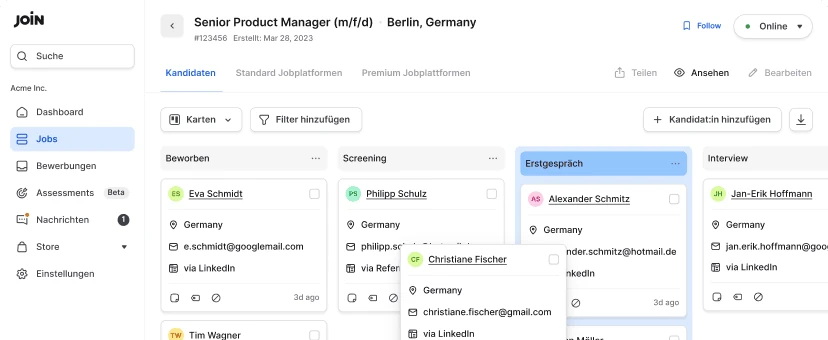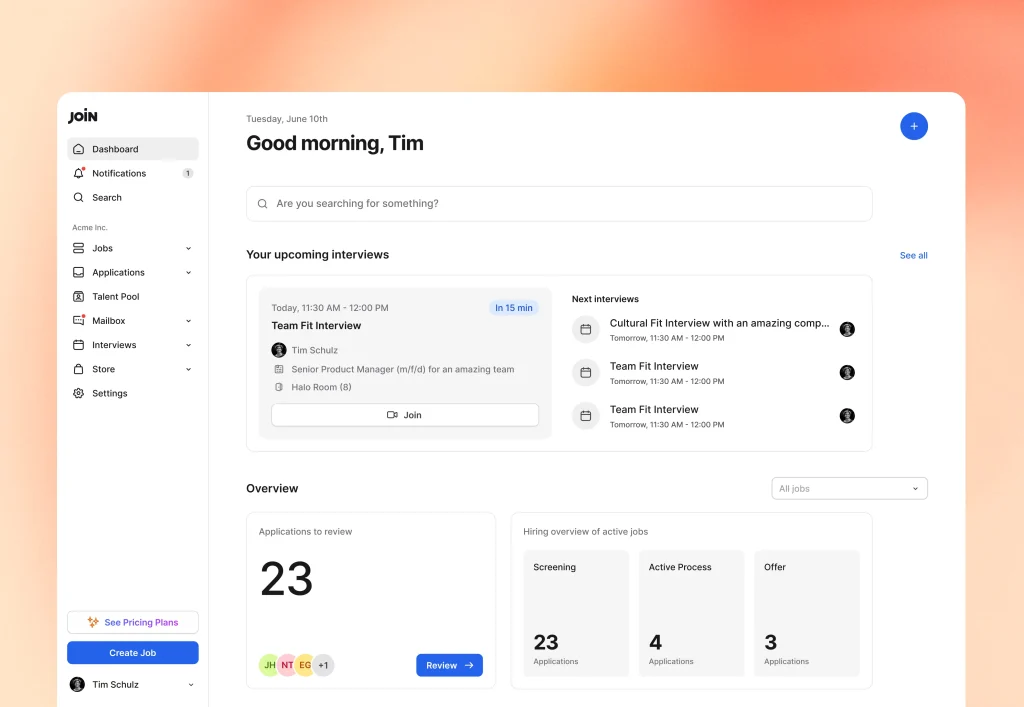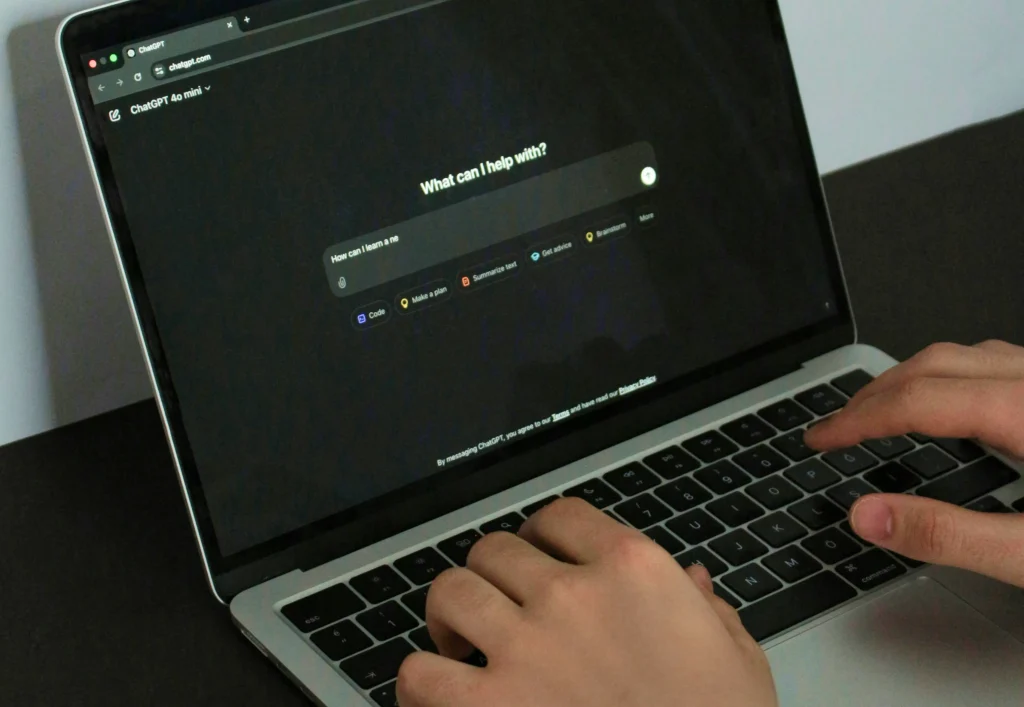Best interview questions for your hiring process
Data Analyst Interview questions
Data Analysts play a vital role in helping organisations to grow and improve themselves. Whether this means scaling up, streamlining processes or expanding into new markets, a Data Analyst can provide the expertise needed to make an informed decision on any big changes. They’ll work closely with C-Levels and developers to help capture data and create reports.
When interviewing a Data Analyst, you should be looking for the following skills:
- Highly skilled in data capturing and analytics.
- Incredible communication skills.
- Proven experience creating and presenting reports.
- Using data to create actionable insights.
- Ability to work with data visualisation tools.
- Fluency in Python and other scripting languages.
- High level of problem-solving skills.
- Ability to guide a team.
Interviewing a Data Analyst
A Data Analyst has the know-how to ensure each decision you make is in the best interest of your business. Therefore, getting the first conversation with them right is essential. Along with preparing analytical questions for your interviews, it’s important to assess their confidence in presenting their findings.
To help you make that decision, we’ve put together these guide interview questions for a Data Analyst. Keep in mind, though, that these questions are to be used early in the interview process to help you decide if the candidate is a good fit for the role or not ASAP.
How to open the job interview
Even more senior roles are bound to feel nerves in the early interview stages. That’s why it is important, as the interviewer, to put your candidate at ease before jumping into the deeper stages of the interview.
Before firing off the data analytics interview questions, why not try out some lighter openers? That way, you’ll put the candidate at ease and will be able to assess their personality and talents more honestly.
Best interview questions for your hiring process
See our Data Analyst Job Description hereFor the interview
A positive opener to start
What trends or developments in data analytics are exciting to you at the moment?
How did you come to choose data analytics as a career?
Behavioral Questions
When presenting a complex data point to someone less experienced in the field, how do you be sure your point is getting across?
Which kind of work environment do you believe you perform best in, and why?
This will give you an idea of the candidate’s adaptability and how well they will fit into your specific work environment.
What is the largest data set you have worked with, and how did you manage this situation?
Dependent on your particular business, you may require your Data Analyst to handle particularly large data sets. This is an indirect data analysis interview question that will reveal their confidence in doing this, as well as their willingness to step up to a challenge.
What are some common problems you faced in your last Data Analytics role, and how did you overcome them?
This is not only a great way to measure the candidate’s problem-solving skills but also gives you the chance to foresee if there will be blockers when bringing them onboard and tackle them beforehand.
Soft Skills
How would you guide a team through a switch of processes or a move to different tools?
This is a good chance to gauge a candidate’s people skills, as well as their leadership ability. You’ll also get an idea of their confidence in their specific role knowledge.
How important do you think it is to be creative when working in a Data Analyst role?
Having confidence in their creativity will allow a Data Analyst to test and try methods and theories that may not have been thought about in your company before, which is great for growth.
If you were to make a mistake when running a data analysis with a sharp deadline, how would you handle this situation?
Mistakes happen to all of us, seeing how a candidate handles stress and puts their problem-solving skills to use is a great way to tell if they’re a good fit in your office
When given multiple solo projects to work on with tight deadlines, how do you ensure you stay organised and motivated?
This is a great opportunity to see how well the candidate works under pressure, as well as gauge their time management and organisation skills.
If you discovered you could not meet a deadline you were set, how would you deal with this?
Here you’ll get an insight into the candidate’s honesty and communication skills, as well as another look at how they deal with problems.
Hard Skills
What skills do you possess that you believe makes you a good Data Analyst?
This question is permission for your candidate to brag! Here, you’ll get an idea of what their strengths are, what they’re most confident in and an insight into their past working experience.
What has been your experience with using Excel in Data Analysis?
Excel is the most basic Data tool for a candidate to know, they should be pretty fluent in collecting and sorting data with it. It’s also an excellent tool for them to present complex data sets to less experienced team members.
What other software and tools do you use daily?
Here you’ll get an insight into what they can bring to the table in terms of tools and software, you’ll also find what they will need to be trained in and what they can pick up right away.
What is your experience with data cleansing?
If this will be a big part of the role you’re hiring, it’s best to ensure that the candidate is well experienced in this area. They should be able to name some common data cleansing techniques, as well as walk you through their experience.
What would you say are the good characteristics of a good data model?
Here, you’ll get a deeper understanding of how they analyse and look into their data sets and whether this fits in with your current business.
What are your essential steps when starting an analytics project?
This will give you an idea of whether their analysis is as in-depth and experienced enough for your position, as well as another insight into their ability to manage their time.
Operational / Situational Questions
What would you do if you began an analytics project and found that some data was suspicious or missing?
This can happen from time to time in a data analytics role, so knowing how an employee would deal with solving this problem and putting in place a process to avoid it happening again is ideal.
If given a confidential data set to work with, how would you ensure that you handled this correctly?
In some cases you may need a Data Analyst to work with sensitive or confidential data, knowing that they are able to handle this professionally is important for this role.
Have you got experience with automating a process that was previously manual? If so, please walk us through it.
One great benefit of having a data analyst on your team is that they can often speed up processes by automating repetitive tasks or procedures. Here, you’ll gain insight into how that can be done.
Tell me about a time when you’ve worked with a stakeholder who was difficult or not performing as a ‘team player.’
As Data Analysts will often work with many departments and stakeholders, it’s good to get an idea of how well they can get information that they need, as well as work with different personality types.
How do you effectively proofread your own reports and code? Please walk me through the process.
Often, attention to detail is essential in a data analytical environment. This question will not only ensure the candidate already has a good process in place but will also demonstrate that they understand this importance.

Start hiring and prepare your interview
All platforms are available for you to promote your job through JOIN.
Create job ad for free


A Data Analyst will often have to present a report or findings to senior management, who may not have a full analytical background. So, it’s important to ensure they’ve got the communication skills needed to do this.